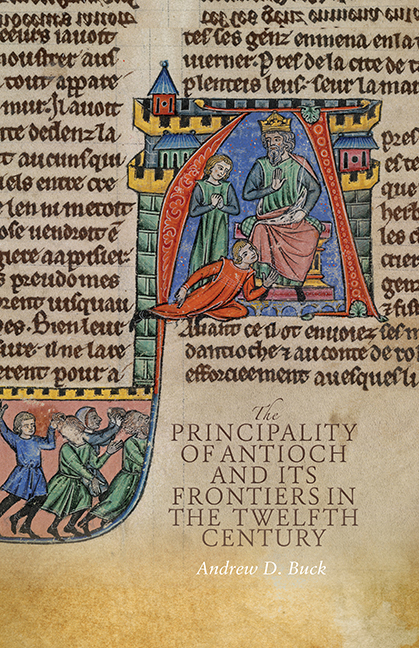Book contents
- Frontmatter
- Contents
- List of Maps
- Acknowledgements
- Abbreviations
- Introduction
- 1 The Extent of the Principality
- 2 The Rulers of Antioch
- 3 Central Governance and Military Service
- 4 Lordship in the Principality
- 5 A Frontier Society? The Nature of Intercultural Relations
- 6 Relations with Byzantium
- 7 Antioch and the Latin East
- Conclusion
- Bibliography
- Index
2 - The Rulers of Antioch
Published online by Cambridge University Press: 09 May 2017
- Frontmatter
- Contents
- List of Maps
- Acknowledgements
- Abbreviations
- Introduction
- 1 The Extent of the Principality
- 2 The Rulers of Antioch
- 3 Central Governance and Military Service
- 4 Lordship in the Principality
- 5 A Frontier Society? The Nature of Intercultural Relations
- 6 Relations with Byzantium
- 7 Antioch and the Latin East
- Conclusion
- Bibliography
- Index
Summary
The princes and ruling elites of Antioch thus faced an array of territorial and political challenges, perhaps more so than in any other contemporary polity. For Claude Cahen, this created a vigorous, top-down ‘feudal’ regime, with the prince in full control of governance and able to extract unlimited service from all fief-holders – a view largely shared by Hans Mayer. Cahen did admit that the prince was not the master of administration, insofar as ‘legislatively or judicially, the principality was served in common by the prince and the court’; but this referred more to notions of delegation, rather than a belief that non-princely factions could keep the ruler in check. Thomas Asbridge has since argued that a prince's power may have varied according to personality, while Jean-Marie Martin has posited that the Antiochene haute cour may have increased in authority, which led to a reduction in the mundane administration of lordly dues through the office of the secreta (a position of Byzantine origins that recorded and maintained the landholding and financial dues of the region). Yet, no historian has so far truly challenged Cahen's original thesis. Therefore, the princes of Antioch have been considered de facto monarchs, exercising the same breadth of authority traditionally – if not accurately – ascribed to the great kings of the West, and perhaps even more than the rulers of Jerusalem. Just as modern research has reassessed Western and Jerusalemite ‘feudalism’, however, arguing for its varied and non-uniform application, as well as the clear limitations to centralised authority, particularly on contested frontiers, there is a similar need to re-evaluate the principality's political structures. This is made especially pertinent by the fact that, in leaving behind an infant daughter in Constance, Bohemond II's death in 1130 – perhaps more immediately politically significant than it was militarily – created the opportunity for the rise of a new ruling dynasty and offered the nobility charged with the task of choosing the new prince the chance to re-negotiate Antioch's relationships of power.
- Type
- Chapter
- Information
- Publisher: Boydell & BrewerPrint publication year: 2017



